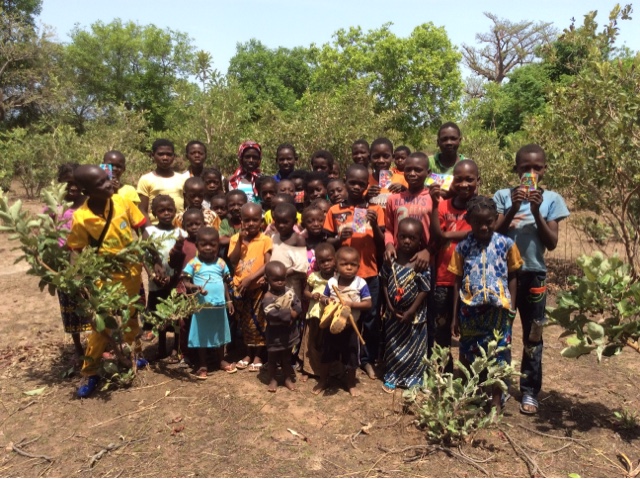Facing Persecution: Lessons Learned From the Faith of Children
The pattern in the dust looked beautiful and intentional, like brush strokes on a canvas, but this artwork was done by children with a broom made of stiff grass.
Last week when we had sat under this same tree to do our Sunday school with the children, it was overgrown and the children sat on mats with little branches poking through. But this week, in preparation and anticipation of our arrival, the children had worked together to pull out all the scraggly bushes. They had removed all the rocks and plucked all the weeds. They had even swept the dirt, making circular patterns in the dust.
I watched as they laid out mats on the ground and sat down quietly, already attentive to hear the Word of God again.
Before one word was out of our mouths, a shirtless man marched up to the shade of our tree and started brashly speaking to us in Dagara. The eyes of the children were fixed on him, and they heard every word he said. Even though I can't speak Dagara, I could understand that he was not happy.
While Rebeca responded the man, I leaned into Charlotte and asked a quiet question to which I already knew the answer. "Is there a problem?"
"He is asking us if we have permission from the village chief to come here and teach the children." Rebeca gently and graciously explained that we were just a branch from the church "that already has approval to meet right over there," she said as she pointed in the direction of the thatched hangar about a hundred yards away that was filled with men and women who were loudly singing and clapping.
This answer did not meet the satisfaction of our agitated visitor, and so he demanded that we leave. Not wanting to stir up trouble, we rolled up the mats and moved to the shade of another tree that was far enough away to be out of his sight. He walked off grumbling and the children whispered to themselves as they followed the dirt path to our new shade tree.
We quickly learned that in our Sunday school was a child whose father had recently died. During the funeral ceremony, the children of the man had influenced the family to not perform some of the traditional sacrifices and customs associated with animism. This Christian family had chosen to go against cultural tradition because of their faith in Jesus, and the children had played a big role in that decision.
That explains the real reason the man was angry. "You are influencing these children to reject and ruin the traditions of our forefathers," he said.
The children, who had heard every word and watched our interaction with this man, were bothered. It's not like they were scared. No, they wanted to stand up to him. It was more like they were upset that someone would try to stop them from believing in what has brought them life.
The following week, we returned again to the same village to find the shade of the second tree swept just as clean as the first one. This time again, as we were singing the first song, an uninvited, clearly upset man arrived on his bicycle, chewed us out for just a minute, and then rode off still muttering as he went.
As we watched him go, Charlotte prayed, "May God touch his heart."
Thankful that we didn't have to move again this time, we continued with the singing, praying and lesson, which was the birth of Jesus. Charlotte beautifully shared the gospel with the children and asked if they were ready to follow him. Almost all of the children raised their hands and we prayed together. At the very end, we encouraged them specifically in regards to persecution, telling them to expect it and respond to it by standing firm in their faith.
"Jesus is more powerful than sacrifices," Charlotte said over and over again, and the children nodded their heads because they truly understood. She explained how Jesus gave his life as the ultimate sacrifice so that other sacrifices are no longer necessary. Rebeca reiterated everything she said, and then I finished with a prayer from the bottom of my heart for these children and the realities they face.
Even at a young age, they know what persecution is. Even at a young age, they are learning that Jesus is our sacrificial lamb and that they must not worship other gods, even if it means standing up to the leaders and abandoning traditional practices. This is the generation that is going to grow up with a true faith, one that is not tinged with the syncretism of Islam or animism. This is the generation that is going to change the culture and redeem what has been made wrong or confused over the years. This is the generation that is going to awaken the church and reach their people for Jesus Christ.
"Those children are already anchored in their faith," Charlotte reflected as we left the village and watched the children wave goodbye.
"We have a lot to learn from them," I added.
Maybe that's why Jesus said to have faith like a child. It means more than just having a simple faith like a child; it also means having a resistant and resilient faith, a faith that stands strong in the face of opposition.
The faith of a child sometimes means coming to Jesus and sitting playfully on his knee, but it also means standing up when necessary to the authorities, to the idolatry, and to the old way of doing things that does not please God or put him first.
Is our faith childlike enough to do the same today?

Comments
Post a Comment